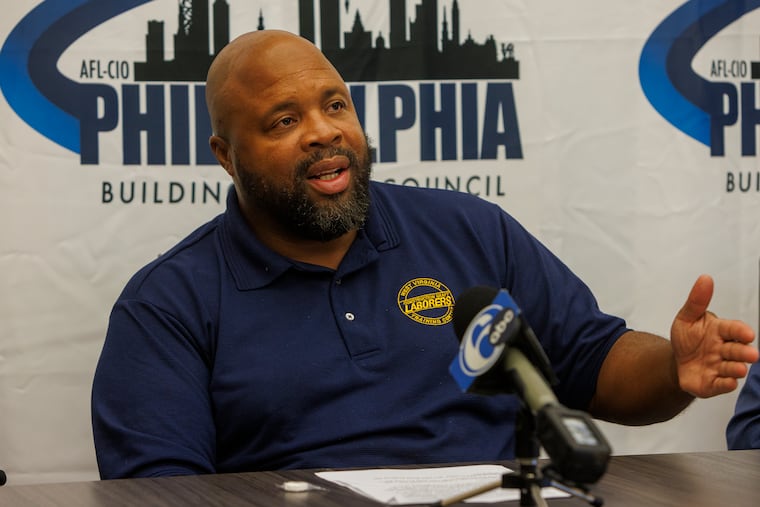The powerful Philly building trades are backing City Council candidates based on the proposed Sixers arena
The deep-pockets Philadelphia Building & Construction Trades Council says it is endorsing Republican Jim Hasher for City Council because he supports the proposed 76ers arena.

If there was ever doubt that the proposed 76ers arena is driving Philly city politics, a coalition of 30 building trades unions made sure on Wednesday that there was no ambiguity.
The Philadelphia Building & Construction Trades Council, one of the most politically potent and deep-pocketed organizations in the state, endorsed five candidates running for seven at-large seats on City Council: four Democrats, plus Republican Jim Hasher.
The decision means the building trades will throw their financial might behind a GOP candidate who is locked in a tight race against the progressive Working Families Party, of which incumbent Councilmember Kendra Brooks is a member.
Ryan N. Boyer, business manager of the building trades, was clear about why: Hasher “supports the new arena, and we are proud to have endorsed him.” Brooks, meanwhile, opposes the current arena proposal.
Boyer’s explanation for endorsing Hasher was another indication of how the controversial $1.55 billion proposal is playing a significant role in city politics and the November general election for mayor and Council. Supporters say it will revitalize Center City and create 10,000 construction jobs. Opponents say it could destroy Chinatown, because it would sit on the neighborhood’s southern edge.
The building trades are huge proponents of the arena project, which is expected to take center stage in City Hall come January as the Sixers seek Council approval.
‘This endorsement means everything’
Backing from the building trades is a coup for candidates who win it. The group played a critical role in lifting Cherelle Parker to win the Democratic mayoral primary in the spring and has long been one of the biggest political benefactors in the region. They accounted for more than half of Hasher’s campaign dollars, and are planning a door-knocking and literature operation on his behalf.
“This endorsement means everything,” Hasher said. “This type of race is not doable, especially for a Republican, without labor support.”
» READ MORE: The future of a new Sixers arena shifts to City Hall after a year of contention
Meanwhile, a spokesperson for Brooks’ campaign said she has a “great relationship” with the building trades and plans to continue that in Council.
The building trades’ backing of Hasher was also a snub for Rue Landau, the only Democratic nominee to not receive their support.
Boyer said Wednesday morning that Landau “stated opposition” to the arena project. But Landau has said in public forums and on questionnaires that she is awaiting the results of a forthcoming community impact study before reaching a conclusion on the project one way or the other.
Landau, who is poised to become the first openly LGBTQ member of Council in city history, was also supported earlier this year by a variety of labor groups, including several individual building trades unions.
No one at the building trades could recall Wednesday when she said she opposed the project. Frank Keel, a spokesperson for the trades, said her campaign showed an “unwillingness to state its clear-cut position on a new 76ers arena leav[ing] the Philadelphia Building Trades with no other choice than to assume that she opposes it.”
The four Democrats who did win the endorsement — Nina Ahmad and incumbents Isaiah Thomas, Katherine Gilmore Richardson, and Jim Harrity — also haven’t said definitively that they support the arena project.
According to Boyer, “they didn’t un-endorse it.”
An unusually competitive race
In the high-stakes race for seven seats on Council that serve the city at large, voters can choose up to five candidates. Each party can nominate only five people, meaning two seats are effectively reserved for members outside the dominant party.
» READ MORE: Progressive third-party candidates outraised Republicans in Philly City Council race
The GOP held those seats for decades. But the Working Families Party upended the calculus in 2019, when Brooks became the first third-party member to win a Council seat in modern history. It means unions are navigating a general election that’s newly competitive compared to in past years.
Brooks is running for reelection alongside the Rev. Nicolas O’Rourke in a hotly contested race against GOP candidates Hasher, a small business owner, and Drew Murray, a civic association leader.
Eleven other unions outside the building trades have endorsed both Working Families Party candidates, and they don’t think Boyer’s group has a monopoly on political influence.
Perhaps the best example is 32BJ of the Service Employees International Union, which represents commercial cleaners and property service workers in the region. SEIU 32BJ is closely aligned with the Working Families Party, and four years ago, was the largest donor to its campaign activities in Philadelphia.
During a news conference last month, Daisy Cruz, 32BJ’s Mid-Atlantic district leader, said Brooks and O’Rourke “have a documented history of showing up and speaking on behalf of our workers.”
“Are our downtowns going to be a playground for the rich?” she said. “Or are they going to be the fountain of good, family-sustaining jobs in our communities?”